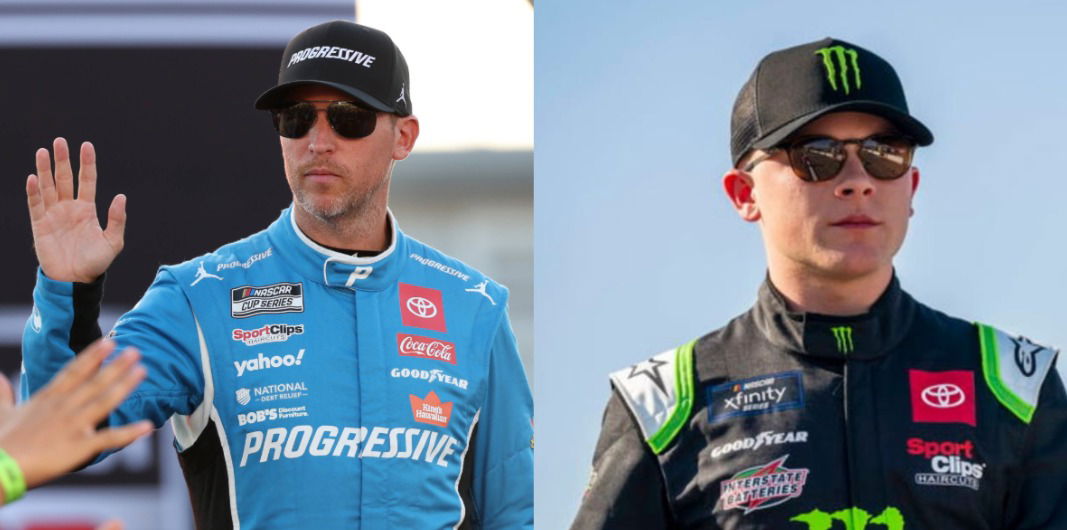
Imago
denny hamlin ty gibbs

Imago
denny hamlin ty gibbs
The dynamic between Denny Hamlin and Ty Gibbs has long been one of NASCAR’s most scrutinized storylines. Hamlin, co-owner of 23XI Racing and a veteran driver at Joe Gibbs Racing, has been both mentor and competitor to the 22-year-old rising star. With JGR and 23XI often sharing manufacturer ties, cooperation was seen as a given. Instead, several recent on-track run-ins have shifted the perception of their relationship, making Hamlin’s voice of authority all the more relevant. What seemed like a natural partnership is now layered with tension.
Watch What’s Trending Now!
That is what makes the fallout from New Hampshire Motor Speedway particularly striking. With both drivers locked in playoff battles, every move carried heightened stakes. Hamlin has never been shy in calling out those he believes undercut his efforts. Earlier in the season, he praised Gibbs’ potential, but his recent tone shows a noticeable change. “He’s got talent and the speed is there,” Hamlin admitted on his podcast earlier this year, while warning that composure would be the deciding factor. That foresight proved almost prophetic in New Hampshire, where one incident reshaped not just a race but Hamlin’s trust.
Denny Hamlin calls out Gibbs’ decision
The breaking point came when Denny Hamlin replayed Gibbs’ stage-two battle. He painted it as a decision that turned ally into an obstacle. “We were racing really too hard, and in my mind, it was entirely too hard,” Hamlin said, recalling the moment. “At the time, we were racing for 11th place… We were battling for stage points, which was life or death for us.”
For Hamlin, the frustration was not simply about track position but about context. Gibbs was already out of the playoffs, yet he was holding up two teammates still fighting to advance. The way Hamlin described it, “I thought I had a teammate, and then to see that play out like it did, it felt like betrayal.” His choice of words carried weight beyond a single race.
Denny Hamlin was frustrated in how his Joe Gibbs Racing teammate in Ty Gibbs was racing him, so he dumped him at the next chance he got.
Hamlin is still in the playoffs chasing his first title, but Gibbs didnt qualify this year. pic.twitter.com/fC2Pw5hbn2
— Always Race Day (@AlwaysRaceDay) September 21, 2025
What followed was a broader airing of grievances. Hamlin pointed to a lack of big-picture awareness. “This is the race craft that I feel is missing, understanding the situation,” he explained. “If you have to race your teammates harder than anyone else on the track, it’s really tough for any of us to win.”
Hamlin even contrasted Gibbs’ stance with Ross Chastain’s earlier decision to yield. “For God’s sake, Ross Chastain let me by… He thought, well, I’m not going to hold him up for the entire 60-lap run.” To Hamlin, that comparison underscored his disappointment. If even a rival on the playoff cut line could see the bigger picture, then the expectation for Gibbs to do the same was even higher.
The intensity of Hamlin’s comments highlights more than just an in-race squabble. It reveals the fragile balance between established veterans and ambitious young drivers, especially when organizational ties blur the line between ally and adversary. Gibbs’ decision may have been instinctual, but Hamlin’s reaction shows it cut across professional and personal lines.
Hamlin admits his mistake after New Hampshire race
Denny Hamlin described the Mobil 1 301 at New Hampshire as “a really rough race,” highlighting multiple challenges that shaped his final result. With the playoffs intensifying, every stage and position matters. Hamlin acknowledged that his team was not at its best during the event. “Just got to get a little better and certainly we didn’t come here with our best,” he said, pointing to both car performance and his own execution.
One of the key struggles Hamlin identified was the restart phase. “Just a bad restart on my part. I just couldn’t get going with the bottom lane. Every time we started on the bottom, just could not get anything going,” he explained. The difficulty in gaining momentum cost him several positions, highlighting the thin margins between success and setback on a track where track position is crucial.
Hamlin also took responsibility for on-track contact during the race, calling it “super unfortunate.” He noted, “The contact came from us… I don’t have any other comment other than that.” While he refrained from detailed explanations, the admission underscored his accountability and the challenges of balancing aggression and control in a tightly contested field.
Hamlin emphasized the importance of improvement and adaptation. “Got to get a little faster, got to get the car handling better and I’ve certainly got to do a better job,” he said. With the playoffs continuing, Hamlin and his team will aim to address these shortcomings. They should fine-tune both strategy and execution to remain competitive in the high-stakes final stretch of the season.







